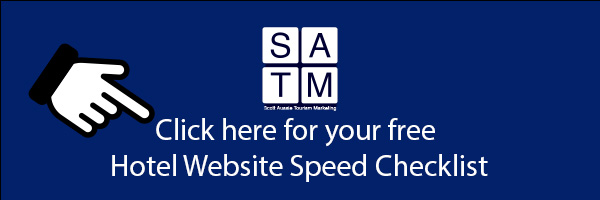Why Optimisation is Essential for Bookings (and Your Sanity)
Right then, let’s be honest, how many times have you been browsing online, trying to find that perfect hotel for that much-needed break, you click a link, and then you’re left twiddling your thumbs while the page loads slower than a snail on a Sunday morning? Sound familiar? Well, that, my friends, is what your potential guests are experiencing with your website right now! It’s like watching a kettle that never boils – utterly frustrating!
Let’s be clear, a slow-loading website isn’t just a minor annoyance. It’s a fundamental marketing blunder that can directly impact your bookings, and more importantly, your bottom line. It’s the digital equivalent of locking your doors to potential guests, leaving them to seek their holiday accommodation elsewhere. And it’s costing you money, day in, day out.
Here’s why website speed is absolutely non-negotiable for anyone in the tourism and hospitality business:
- User Experience is King (and Queen, and the Whole Darn Royal Family): You and I know first impressions matter. It’s no different for your online presence. If your website loads slowly, guests won’t stick around – they’ll head straight for the exit, or in this case, a competitor. It’s a bit like having a beautiful hotel but with a broken front door. No one can get in, so no one’s going to book.
- SEO’s Silent Partner: Google and other search engines love fast-loading websites. They actively prioritise them in search results, and they’re not shy about it. A slow website is like being stuck in a digital traffic jam – you’re pushed to the back, meaning fewer people can find you. As Google themselves have said, over 50% of visitors will abandon a website if it doesn’t load within 3 seconds, so this isn’t a problem you can simply ignore.
- Mobile-First is a Must: The majority of web traffic comes from mobile devices these days, and that’s especially true in the tourism sector. A slow website on a phone is basically a disaster. A fast site provides a smooth and seamless user experience for mobile users, which means that they’re far more likely to hit that all-important “book now” button.
- It’s All About the Brand, Baby: A fast, responsive, and easy-to-use website broadcasts a message of professionalism, care and attention to detail, and efficiency. It’s a signal that you care about providing your customers with a positive experience from the very start. On the other hand, a sluggish website screams the opposite. You’ll lose sales and bookings and your business won’t get the message across that you care about their experience.
- Cost-Effective Growth Strategy: You’d be forgiven for thinking that website speed optimisation is some complex and expensive undertaking, but some of the most valuable techniques can be implemented at little or no cost. And frankly, the returns from doing so more than justify any investment. It really is that important!
- Get Ahead of the Competition In today’s world, every hotel website is vying for attention. Website speed is something that many of your competitors simply aren’t optimising, and that leaves an open goal for you to make a real difference and attract more bookings. It’s time to give your hotel the edge it deserves.
Okay, so you’re on board. You understand the importance, but what’s stopping you from taking action? Here are some of the most common excuses, and what I’ve got to say about them:
- “My website’s already fast enough.” I hear you, but it’s easy to be fooled. What seems quick on your own device might be a completely different story for someone on a slower connection, or on a mobile device. It’s time to stop relying on assumptions and test your website properly.
- “That’s a techie thing, not a marketing job.” Nonsense. Website speed optimisation isn’t just a technical detail, it’s a fundamental marketing problem that directly impacts your visibility, user experience and ultimately revenue.
- “It’s too complex and expensive” I can hear you all now – it’s going to cost a fortune and take too long. Yes, some advanced techniques may cost a little, but a lot of the most beneficial improvements are free and straightforward. There’s even some that you can action today!
- “If it ain’t broke, don’t fix it.” That’s like saying “My horse and cart is working fine, I don’t need a car”, so it’s time to step into the 21st century. A slow website is actively harming your business.
- “I’m more concerned with visual appeal.” Okay, I get it; you need a beautiful website. That’s fair. But a website that’s a beautiful photo album will also be terrible for your users if it takes forever to load. So let’s find a balance between beauty and functionality.
- “I don’t have the time or resources” I understand, you’re busy, but some simple steps (like image optimisation) will take no time at all and the gains will more than justify the effort.
- “I’ll just spend more money on ads”: Sure, ads are valuable, but they’re not the full solution. If you’re spending money to send people to a slow-loading website, you might as well just light the cash on fire. And, as we learned from that first research paper (Bilgihan & Ricci, 2023), “user-friendly websites” are key to a successful digital marketing strategy, and that means speed.
Website speed isn’t an isolated issue either; it’s the foundation on which everything else is built. Think about it – what’s the point of offering a fantastic VR tour on a website that takes an age to load? Or a state-of-the-art chatbot on a website that’s slower than a snail? These new technologies are fantastic, but they can only work on websites with a solid technical foundation. It also underpins the success of your review management, direct bookings, and social media campaigns. Think of it as the invisible scaffolding that supports your entire online presence. Remember that article about social media trends for 2025? ( 2025 Social Media Trends Tourism & Hospitality Edition) – you can’t expect to make the most out of social media if your site is slow!
So, how can you get started? Well here’s a few points you need to consider:
- Image Optimization: Big, beautiful images are a website’s kryptonite. Compress them, use the right formats (e.g., WebP), and try “lazy loading,” so they only load when needed.
- Minify Code: Just like tidying your hotel rooms, your website code can get cluttered. Cleaning it up, and removing unnecessary characters or code will give a boost in performance.
- Leverage Browser Caching: Your browser caches some website data so returning visitors don’t have to download everything again each time. Take advantage of that!
- Choose a Proper Hosting Provider: Your server is the engine of your website. A cheap, shared server may seem like a good idea initially, but it will harm your website performance in the long run.
- Use a CDN: Use a content delivery network that hosts your files on servers around the world so it’s fast for everyone, no matter their location.
- Test, Test, Test! Use Google PageSpeed Insights and GTmetrix to diagnose any speed issues. Without this data, you’re just guessing, so use the tools!
Website speed optimisation isn’t just a tick-box exercise; it’s a continuous process that is essential for revenue and growth. As that research paper on digital marketing orientation (Mahmutović, 2021), said, you need to be data-driven and continually optimising to gain any real competitive advantage.
So, is your hotel website a speed bump, or is it a smooth road for your potential customers? It’s time to stop making excuses, and make your website fast. It’s not as daunting as it sounds, and we at SATM are here to help if you are struggling. How To Dodge The BS and Find a Marketing Partner Who Actually Gets Your Tours – make sure you select a marketing partner who understands the importance of website speed, and who knows how to get results! Don’t wait, your competitors sure as hell won’t!











